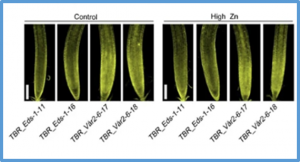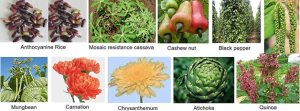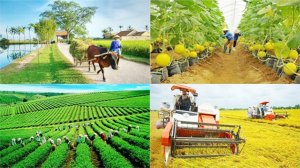
Saturday, 2024/07/27 | 06:13:59
MeFtsZ2-1 is a key gene for plant plastid division, but the mechanism by which MeFtsZ2-1 affects pigment accumulation in cassava (Manihot esculenta Crantz) through plastids remains unclear. We found that MeFtsZ2-1 overexpression in cassava (OE) exhibited darker colors of leaves, with increased levels of anthocyanins and carotenoids. Further observation via Transmission Electron Microscopy (TEM) revealed no apparent defects in chloroplast structure but an increase in the number of plastoglobule in OE leaves. RNA-seq results showed 1582 differentially expressed genes (DEGs) in leaves of OE.

Natural variation of TBR confers plant zinc toxicity tolerance through root cell wall pectin methylesterification

Researchers from China National Rice Research Institute and partners have identified that the Trichome Birefringence (TBR) gene allows plants to handle extra zinc in the soil. Zinc is an important micronutrient that can become toxic to living cells when present in excess. Therefore, plants have developed mechanisms that will help them tolerate zinc toxicity. Plants absorb zinc on their cell walls through a process called pectin methylesterification. In this process, the structure of the cell wall's pectin molecules were altered to store additional zinc.
-
7th Asian Short Course on Agribiotechnology, Biosafety Regulation, and Communication
Friday, 2024/07/26 | 08:26:15 -
2024 SOFI Report Presents Financial Strategies to Address Food Insecurity and Malnutrition
Thursday, 2024/07/25 | 06:50:22 -
Japan Government Guarantees No Cross-contamination Between GM Crops and Non-GM Crops
Wednesday, 2024/07/24 | 08:15:44 -
Australia`s Gene Technology Regulator Invites Comments on Field Trial of GM Canola
Tuesday, 2024/07/23 | 08:08:01
Saturday, 2024/07/27 | 06:13:59

MeFtsZ2-1 is a key gene for plant plastid division, but the mechanism by which MeFtsZ2-1 affects pigment accumulation in cassava (Manihot esculenta Crantz) through plastids remains unclear. We found that MeFtsZ2-1 overexpression in cassava (OE) exhibited darker colors of leaves, with increased levels of anthocyanins and carotenoids. Further observation via Transmission Electron Microscopy (TEM) revealed no apparent defects in chloroplast structure but an increase in the number of plastoglobule in OE leaves. RNA-seq results showed 1582 differentially expressed genes (DEGs) in leaves of OE.
-
Natural variation of TBR confers plant zinc toxicity tolerance through root cell wall pectin methylesterification
Friday, 2024/07/26 | 08:28:00 -
Safety of soy leghemoglobin from genetically modified Komagataella phaffii as a food additive
Thursday, 2024/07/25 | 06:50:40 -
Cold tolerance SNPs and candidate gene mining in the soybean germination stage based on genome-wide association analysis
Wednesday, 2024/07/24 | 08:17:08 -
Trends and Evolution of Research on Genetic Modification: A Bibliometric Analysis of Scientific Literature During 2000-2020
Tuesday, 2024/07/23 | 08:11:41

Scientists from the Helmholtz Institute for RNA-based Infection Research (HIRI) in Germany developed a new method which allows RNA detection using Cas12 nucleases. CRISPR is a widely used technique that has many applications in various industries. Aside from Cas9, Cas12 nucleases are also typically used in research studies. However, Cas12 nucleases only detect DNA.
-
Virginia Tech Researchers Find Potential Method to Control Mosquito Populations
Friday, 2024/07/26 | 08:26:52 -
EFSA Releases Scientific Opinion on Food Additive with GM Komagataella phaffii
Thursday, 2024/07/25 | 06:50:32 -
Researchers Develop Novel Cotton Quality Module to Help Farmers
Wednesday, 2024/07/24 | 08:16:23 -
Researchers Discover Zinc`s Role in Nitrogen Fixation of Legumes
Tuesday, 2024/07/23 | 08:08:45
Mr. Phạm Thành Nhân, Dong Thap Muoi Research and Development Centre, leaving for IRRI, the Philippines, to join the three-month training course by IRRI from November 13, 2019 to January 21, 2020
-
Going Abroad in October 2019
Tuesday, 2019/11/05 | 09:50:01 -
Going Abroad in September 2019
Friday, 2019/10/04 | 08:27:35 -
Going Abroad in August 2019
Thursday, 2019/09/05 | 10:42:34 -
Going Abroad in June 2019
Tuesday, 2019/07/02 | 15:49:57
Mr. Li Jianqiang (Director), Ms. Feng Chunmei (Technical Director), Mr. Tan Yewei (Business Manager) - Subtropical Crop Research Institute, QuangXi, China, paid a short visit how to cooperate with the IAS about crop production and consumption, November 12, 2019.
-
IAS Visitors in September 2019
Friday, 2019/10/04 | 08:28:22 -
IAS Visitors in August 2019
Thursday, 2019/09/05 | 10:43:14 -
IAS Visitors in June 2019
Tuesday, 2019/07/02 | 15:50:34 -
IAS Visitors in May 2019
Monday, 2019/06/17 | 08:09:58

In 2023, the IAS has conducted 34 R&D activities with the total budget of VND 22.58 billion.
The outputs are as followed:
- Thirteen research articles were received and published in Vietanamese journals.
- Nine new crop varieties have developed including 3 varieties of cashewnut; 2 potato; 3 chrysanthemum; 1 carnation (Dianthus caryophyllus)
-
Seminar and workshop in March 2023
Tuesday, 2023/04/04 | 08:10:18 -
Seminar and Workshop in February 2023
Tuesday, 2023/04/04 | 08:09:09 -
Seminar and Workshop in January in 2023
Tuesday, 2023/02/14 | 08:15:10 -
Seminar and Workshop in December 2022
Tuesday, 2023/02/14 | 08:14:03

Vietnam is striving to take stronger measures to achieve “net-zero emissions” by 2050. Agriculture has been recognized as a bright spot in the economic development of 2023. Economic and market intelligence played an important part in the sector's growth last year. Traditionally, farmers focused on how to improve production, but higher yields did not always translate to increased income. As prices fluctuate, they may produce more but gain less.
-
Vietnam agriculture in 2022: Switching to an agricultural economy
Thursday, 2023/03/16 | 10:37:17 -
Vietnam Agriculture in 2021 to Smoothly Achieve Its Mandates
Wednesday, 2022/01/12 | 13:31:07 -
Vietnam Agriculture in 2020 to Overcome Its Double Challenges as Covid-19 Pandemic & Climate Change
Thursday, 2021/01/14 | 08:15:31 -
Vietnam Agriculture in 2019 - How To Help Farmer Be Rich -
Thursday, 2020/01/16 | 09:42:44
Address: 121 Nguyen Binh Khiem, District 1, HCM City, Vietnam
Tel: +84.8. 38291746 – 38228371 Fax: +84.8.38297650
Website : http://iasvn.org - Email: iasvn@vnn.vn


 Curently online :
Curently online :
 Total visitors :
Total visitors :
